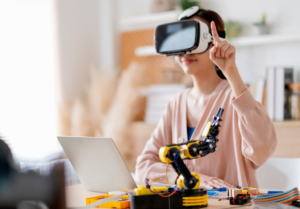We all agree that education plays an important role in our lives and is an essential ingredient if we want to achieve anything, to realise our goals and even communicate with others. On the other hand, it is also known that improving the education system for students requires a lot of work, research and concrete goals, because the changes and challenges worldwide are many and continuous.
Artificial intelligence (AI) is an emerging technology that has the potential to address these challenges in education, support innovative teaching methods, promote new learning practises and accelerate progress in the field. This article briefly discusses some applications of AI in education.

Image by Lifestylememory on Freepik
Applications/uses of AI in Education
Artificial intelligence has given a whole new perspective to education and is now being used by various schools, colleges, teachers and educators in different countries around the world. Here are some applications/uses of AI in education:
- Automate basic activities: AI can be used in various activities that are time-consuming for teachers. For example, there are AI tools that can automate the grading system for closed questions or multiple choice questions, etc.
- Personalise teaching: It is important for teachers to understand the needs of each student so that they can create a tailored learning plan for each student. This can be possible with AI systems that can be programmed to provide personalised learning for students.
- Ensure access for students with special needs: AI technology can help students with special needs, such as deaf or hard of hearing, visually impaired, etc., to understand some things better and interact with their teachers.
- It is being used in early childhood education: AI systems and technologies are currently being used to develop interactive and innovative games for children to teach them basic educational and academic skills and more in an entertaining way.
- Help with scheduling: AI can also help with simpler things, such as helping teachers and educators schedule courses, training, educational visits, etc. and manage their daily, weekly, monthly or yearly schedules.
- Provide helpful feedback to students and teachers with AI-driven programmes: Assessment is an important part of any educational and teaching process. AI-driven programmes can provide teachers and students with feedback on the success of each course so they know what to improve next time.
Artificial intelligence has created a new world with many possibilities and applications in various fields of life, education, etc. However, the rapid pace of technological development inevitably brings with it a host of risks and challenges that have been controversial and beyond the scope of policy debates and regulatory frameworks. Therefore, UNESCO is committed to supporting Member States in harnessing the potential of AI technologies for the implementation of the Education 2030 Agenda.
References:
Administrator (2022) “43 Examples of Artificial Intelligence in Education,” University of San Diego Online Degrees [Preprint]. Available at: https://onlinedegrees.sandiego.edu/artificial-intelligence-education/.
“Artificial intelligence in education” (2023) UNESCO [Preprint]. Available at: https://www.unesco.org/en/digital-education/artificial-intelligence.
Artificial Intelligence in Education – Javatpoint (no date). Available at: https://www.javatpoint.com/artificial-intelligence-in-education.
Here are 4 potential use cases of AI in education sector (2023). Available at: https://www.weforum.org/agenda/2023/04/can-ai-improve-education-here-are-4-potential-use-cases/.
